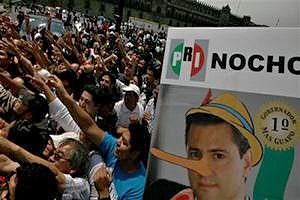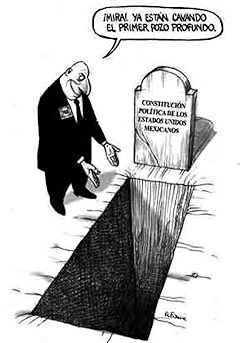|
Mexico, Bewildered and Contested
 |
| Photo Credit: Huffpost Voces |
In a move that appears to complete Mexico’s loss of national
sovereignty to international capital, the senate has finally passed a
sweeping and far-reaching reform of the country’s oil industry. The restructuring is treated with widespread skepticism—polls suggest that about 65-75 percent of
the population oppose President Enrique Peña Nieto’s [1] initiative of
privatization and opening up the national company Pemex to foreign
multinationals.
The changes are indicative of the commitment of successive
administrations to dismantle and tear apart the social contract that was
embodied in the achievements of the Mexican Revolution [2], many aspects of
which were protected until the 1980s.
Every government since the onset of neoliberal reforms following the
1982 debt crisis has staunchly attacked the more progressive aspects of
the post-revolutionary state in favor of privatization, market forces
and foreign investment.
The PRI’s (Partido Revolucionario Institucional) latest reform, which was enthusiastically pushed forward
with support from the opposition PAN (The National Action Party; Partido Acción Nacional), is deeply unpopular among the
population because, since President Lázaro Cárdenas nationalized it in
1938, the petroleum industry has been viewed as a jewel of national
sovereignty and economic independence.
Following the Mexican Revolution and almost two decades of major
upheaval, civil war, and violence, the leaders of the nascent one-party
state recognized that in order to offset the possibility of further
rebellion and revolt, it would have to make some major concessions that
favored the interests of the peasants, industrial workers, and middle
classes.
To a large extent, this was in recognition of the discontent and
revolutionary fervor that the dictatorship of Porfirio Díaz had provoked
in its heavy-handed and repressive efforts to give Mexico a competitive
advantage on the global stage, and in order to compete with other
industrialized economies.
The campaign of modernization and “scientific” economic progress led by
Díaz in the late nineteenth and early twentieth centuries opened up
Mexico’s natural resources and supply of cheap labor to French, British,
and U.S. investors. The rapid expansion of the railroads was highly beneficial to hacendados, caciques,
mine owners, and capitalists because it opened up what they viewed as
virgin territory to capitalist expansion and modernization.
Please support our independent reporting. Donate now!
Yet it had some disastrous consequences for aboriginal peoples living
outside the wage economy as defined and protected by the nation state.
It forced them off their once communally-owned lands and pushed them
further towards the restraints and chains of the capitalist economy via a
process of internal colonization. By 1910 , for example, a quarter of all arable land was in the hands of the government and private capital. And 95 percent of communal land—the once-revered ejido system—was expropriated. Foreign investors similarly owned 130 of the largest 170 corporations operating in Mexico.
Wages were kept low and strikes were met with violent repression, a
context that furthered popular anger with the state and the inequalities
inherent in capitalist modernization, but that kept international
investors—who controlled about 60 percent of the national economy—happy
with the status quo.
The exclusion of broad sectors of the population from participation in
economic and political life, and their consequent disempowerment, set
the stage for one of the most important revolutions of the twentieth
century.
The agrarian reform, the right to strike and to form unions,
universal elementary education, and the nationalization of key sectors
of the economy in the wake of the revolution were significant triumphs
and helped reverse some of Díaz’s modernizing policies that had set the
country so firmly down the route of privatization, foreign investment,
and widening wealth disparities.
 |
| Source: La Jornada |
President Cárdenas’s nationalization of Mexico’s oil industry [3], in
addition to other sweeping popular reforms, was thus a major victory for
national sovereignty.
It was particularly significant because it was achieved at a time in
which the power of European and U.S. colonialism and empire depended
increasingly on access to oil, and as such was an affront to their
imperial ambitions.
Since the 1980s, however, in a reflection of developments at the
global level, protectionism and sovereignty have been increasingly under
attack.
Contrary to the kind of political rhetoric typically used to justify
the sale of national resources to private interests, neoliberal
structural reforms have consistently resulted in very low economic
growth.
Again, contrary to Peña’s inflated claims, that the world’s tenth
largest oil producer will now open its doors to foreign giants like Chevron, Exxon, and Shell does not automatically benefit the Mexican population.
There is every reason to believe that these companies will behave
exactly as they do elsewhere throughout the globe, protecting their own
interests and increasing their already massive profits.
It is hardly a secret that Pemex is already blighted by internal
high-level corruption, but public ownership at least allows for the
pretense of accountability. At present, congress can call upon the director of Pemex to face questioning. As Pemex is in theory answerable to government, congress can hold investigations into corrupt and fraudulent practice.
Yet once private foreign oil giants begin shipping crude to their own
refineries, even the simulation of accountability is likely to
disappear, a situation liable to breed further corruption in favor of
the bottom line.
Peña Nieto’s energy reform of the country’s largest national company
thus represents an additional weakening of the state’s already feeble
democratic functions while empowering and elevating presidential
authority. As Diego Valadés ,
an ex-minister of the Supreme Court notes, the reform will have
profound implications for the nature of democratic rule in Mexico
because it impedes the state’s ability to control and manage the
country’s largest industry and one of its principal sources of revenue.
As a result of restrictions outlined in NAFTA, the state will similarly
be unable to intervene and expropriate resources under private control.
As Valadés points out, this could mean in the future that energy prices
will rise and that if and when Mexico faces oil shortages, the state
will have almost no leverage with which to appropriate supplies from
private companies.
 |
| Source: Al Jazeera |
The reform is the latest illustration that the neoliberal state will
forgo national sovereignty and democracy for increased trade
liberalization and authoritarianism.
As the state becomes weaker in its capacity to restrain the power and
destructive forces of globalization, political power becomes
progressively more centralized, repressive and authoritarian.
This has also had the effect of neutralizing the mainstream political
opposition, which in essence means that the majority of Mexicans have
almost no representation within the electoral sphere. Both the PRI and the PAN actively pushed for energy reform, but even the center-left PRD (Partido de la Revolución Democrática) backed Peña Nieto’s Pacto por México,
an accord signed by the three major parties that made unfulfilled
promises of economic growth and greater democratic freedoms. The
strength of the PRD’s subsequent opposition to the most extreme measures
of the energy reform was undermined by their naïve capitulation to the
two bigger parties by signing Peña’s Pacto.
Meanwhile, protestors have again taken to the streets to voice their
frustrations about the continued sale of the country’s rich natural
resources to multinational corporations and the fact that there exist
almost no channels for voicing legitimate popular grievances within the
traditional electoral system, a problem that is accentuated with each
step the government takes on the path of neoliberal reform.
The current context is rather analogous to the dictatorial measures
imposed by Porfirio Díaz [4] in his crusade for modernization in order to
attract foreign investment.
Were the Peñistas and other political leaders of the elite more
conscious of the country’s history, they might appreciate that each new
reform they impose is likely to set the tinderbox of rebellion alight.
Notes:
[1] His six-year term began in 2012. He is a member of the Institutional Revolutionary Party (PRI) [2] The Mexican Revolution of 1910
[3] Cárdenas's efforts to negotiate with Mexican Eagle, in the managerial control of Royal Dutch/Shell and Standard Oil of New Jersey,
were unavailing, and the companies rejected a solution proposed by a
presidential commission. So at 9:45 pm on the evening of March 18, 1938,
Cárdenas nationalized Mexico's petroleum reserves and expropriated the
equipment of the foreign oil companies in Mexico.
[4] José de la Cruz Porfirio Díaz Mori was a Mexican general,
President, politician and dictator. He ruled Mexico with an iron fist
for 35 years, from 1876 to 1911 (President of Mexico, one month in 1876, then from 1877 to 1880, and finally from 1884 until he was overthrown in 1911.
(Clarifying additions in parentheses and footnotes by S.O'N)
________________
Peter Watt teaches Latin American Studies at the University of Sheffield. He is co-author of the book, Drug War Mexico: Politics, Violence and Neoliberalism in the New Narcoeconomy (Zed Books 2012). |

